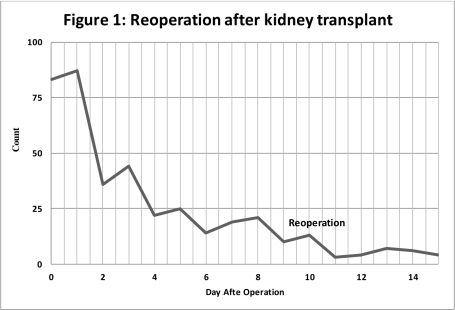A Nationwide Analysis of Reoperation After kidney Transplant.
Surgery, Division of Transplant Surgery, University of Miami School of Medicine, Miami, FL.
Meeting: 2016 American Transplant Congress
Abstract number: 431
Keywords: Multicenter studies, Multivariate analysis, Post-operative complications, Prediction models
Session Information
Session Name: Concurrent Session: Kidney: Length of Stay/Readmission
Session Type: Concurrent Session
Date: Tuesday, June 14, 2016
Session Time: 2:30pm-4:00pm
 Presentation Time: 3:30pm-3:42pm
Presentation Time: 3:30pm-3:42pm
Location: Room 302
Objectives
We aim to report the rate and short-term outcomes of patients undergoing reoperation following kidney transplant in the United States.
Methods
The NIS database was used to examine the clinical data of patients undergoing kidney transplant and reoperation during same the hospitalization from 2002-2012. Multivariate regression analysis was performed to compare outcomes of patients with and without reoperation.
Results
We sampled a total of 172,586 patients who underwent kidney transplant. Of these, 3802 (2.2%) had reoperation during the same hospitalization. Reoperation was associated with a significant increase in mortality (3.1% vs. 0.4%, AOR: 5.40, P<0.01), mean total hospital charges ($249425 vs. $145403, P<0.01), and mean hospitalization length of patients (18 days vs. 7 days, P<0.01). The most common day of reoperation was POD 1  . Hemorrhagic complication (64.1%) was the most common reason for reoperation followed by urinary tract complications (8.9%). Renal vein complications needing reoperation was more than seven times higher than renal artery complications (2.9% vs. 0.4%, P<0.01). Preoperative coagulopathy (AOR: 3.65, P<0.01) was the strongest predictor of need for reoperation and renal artery (AOR: 1.50, P=0.04) and renal vein complications (AOR: 3.62, P<0.01). Also, diabetes (AOR: 1.26, P<0.01) and hypertension (AOR: 1.88, P<0.01) had associations with need for reoperation.
. Hemorrhagic complication (64.1%) was the most common reason for reoperation followed by urinary tract complications (8.9%). Renal vein complications needing reoperation was more than seven times higher than renal artery complications (2.9% vs. 0.4%, P<0.01). Preoperative coagulopathy (AOR: 3.65, P<0.01) was the strongest predictor of need for reoperation and renal artery (AOR: 1.50, P=0.04) and renal vein complications (AOR: 3.62, P<0.01). Also, diabetes (AOR: 1.26, P<0.01) and hypertension (AOR: 1.88, P<0.01) had associations with need for reoperation.
Conclusion
Reoperation after kidney transplant occurs in 2.2% of cases. However, it is associated with a significantly increased mortality, hospitalization length, and total hospital charges. The first day after transplant and hemorrhagic complication are the most common day and reason of reoperation respectively. Preoperative coagulopathy was the strongest factor in prediction of need for reoperation, renal artery complications, and renal vein complications. Controlling coagulation disorders preoperatively may decrease need for reoperation, hospitalization length, and total hospital charges.
CITATION INFORMATION: Moghadamyeghaneh Z, Alameddine M, Burke G, Ciancio G, Chen L. A Nationwide Analysis of Reoperation After kidney Transplant. Am J Transplant. 2016;16 (suppl 3).
To cite this abstract in AMA style:
Moghadamyeghaneh Z, Alameddine M, Burke G, Ciancio G, Chen L. A Nationwide Analysis of Reoperation After kidney Transplant. [abstract]. Am J Transplant. 2016; 16 (suppl 3). https://atcmeetingabstracts.com/abstract/a-nationwide-analysis-of-reoperation-after-kidney-transplant/. Accessed February 23, 2026.« Back to 2016 American Transplant Congress
